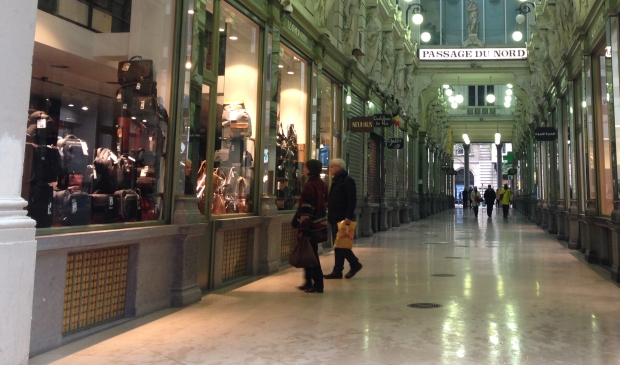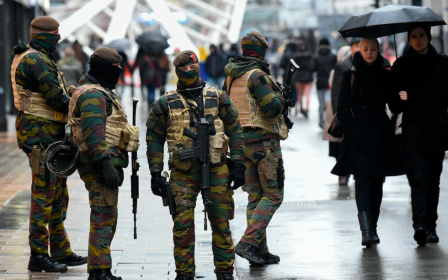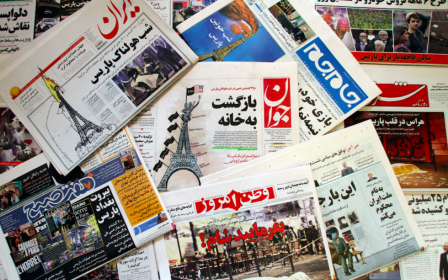Streets empty in Brussels as threat level increases

BRUSSELS - Saturday afternoon often appears busy in the Belgian capital of Brussels. But on Saturday evening, Belgium's State Security announced “they have enough evidence of cells currently present in Brussels" and may have planned "a series of attacks" similar to last week's attacks in Paris.
In response, the Coordination Unit for Threat Assessment (OCAD) elevated the city's terror threat level to four, the highest level possible in Belgium, which translates a “serious and nearby” possible attack.
Armed officers and troops patrolled the near-deserted streets of Brussels all weekend after the government raised the terror alert to the highest level of four in the city of more than a million that is also home to the NATO and European Union headquarters.
Since the government's warnings, Brussels’ main shopping street, the Nieuwstraat, has been nearly empty. Only a handful of shops were open on Sunday.
“We are doing all we can to protect the city. All our forces are put in place and we’re working hard,” said Jan Jambon, the Minister of Interior. “But our opponent is also one to fear.”
Brussels authorities also announced on Sunday that the city will remain at the highest possible alert level through Monday, with schools, universities and metros closed over a threat of attacks.
"What we fear are similar attacks, with several individuals in several places," Premier Charles Michel told reporters.
Belgian police urged the media and residents to adhere to a social media blackout during a series of police operations on Sunday as security forces continued to hunt for Salah Abdeslam, a key suspect in last week's attacks in Paris.
"The threat is considered serious and imminent," Michel said, adding that the rest of the country would remain on security alert level three.
“There is no point in keeping the shop opened,” Ahmed Lufti, who owns a men's suit store in central Brussels, told MEE. “For over a week now we have no costumers. People are afraid so they stay away,” Lutfi complains as he wonders how he’s going to pay his bills and the rent.
“Raising the threat level to four doesn’t make the difference. For more than a week already, people decided to stay indoors,” he added. “This is a catastrophe for small businesses like mine.”
Belgian police arrested 16 people during a series of raids on Sunday after a huge security lockdown, but Paris attacks suspect Salah Abdeslam was not among them, prosecutors said.
"Sixteen people were arrested" including one person who was injured after police opened fire on a car that drove towards police, federal prosecutor spokesman Eric Van Der Sypt told a press conference.
"Salah Abdeslam was not caught during the raids," he added.
Nineteen raids were carried out in various Brussels neighbourhoods including Molenbeek - a poor immigrant district where Adbeslam is from.
Police made three other raids in the industrial town of Charleroi, where an international airport is located.
No weapons or explosives were found in the raids, prosecutors said.
A judge will decide on Monday whether to continue the detained of the men picked up in the raids.
Although the metro network has not yet received direct threats, police think the city's subway system could be a major target for attacks. However, Brussels faces a shortfall of available police officers to adequately protect the metro network. Belgium's prime minister has closed the metro system until Tuesday.
“Federal police is lacking at least 2,000 men. Whenever something big happens, they need all national police to assist. This is a structural problem that urgently needs to be solved,” spokesperson from the police’s labour union said.
In Lokeren, a small town in East Flanders, the mayor said he has been confronted with the same logistical problem. A football match between his city and another Belgian city aimed to take place on Saturday evening was cancelled due to a lack od security personnel.
“The match is a risk match, as supporters of both teams often cause problems,” Filip Antheunis, mayor of Lokeren said. “Therefore we need to use all our police agents to secure the match. Since federal police is employing all of them in Brussels, we can not guarantee the security and thus see ourselves obliged to cancel the game.”
Brussels’ minister-president, Rudi Vervoort, also announced several additional measures, including the cancellation of all major events, such as the large music festival Sound/check that was supposed to take place at the city’s largest concert venue, Ancienne Belgique.
“We knew about the elevation of the threat level this morning, and thus we gathered and met to discuss the need to cancel the event,” Chloë Rasier, one of the organisers, said. “After consulting the police, we quickly bit the bullet. The risk was just too high,” she admitted that the decision left her sad and felt those months of hard work had been wasted.
“We try not to stand still to long at the financial consequences of the decision of course,” she added. “Even if we didn’t cancel, lots of artists would have decided not to come and probably a majority of the visitors would have been too afraid as well.”
New MEE newsletter: Jerusalem Dispatch
Sign up to get the latest insights and analysis on Israel-Palestine, alongside Turkey Unpacked and other MEE newsletters
Middle East Eye delivers independent and unrivalled coverage and analysis of the Middle East, North Africa and beyond. To learn more about republishing this content and the associated fees, please fill out this form. More about MEE can be found here.





